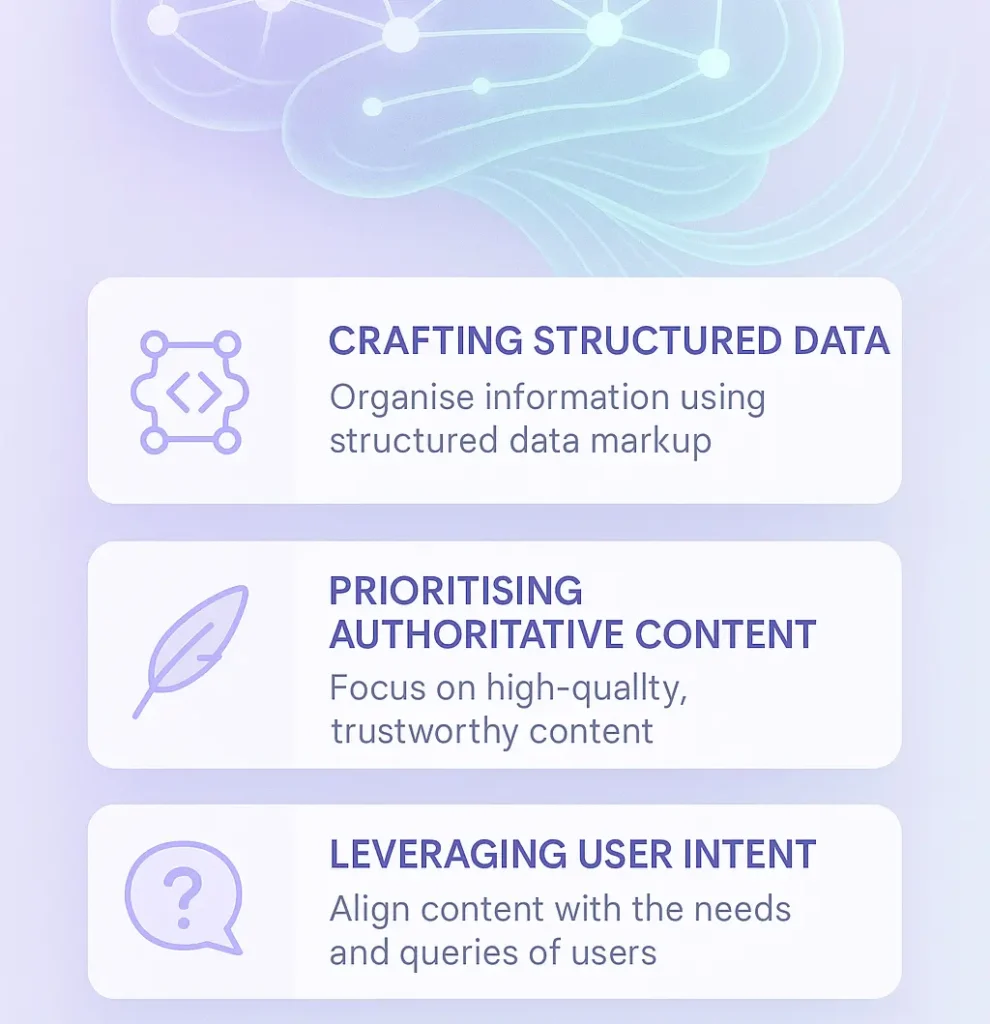It’s 2025, and tools like ChatGPT and Perplexity AI are already the go-to ways to search stuff online. This shift from traditional queries to conversational journeys has opened a new frontier: generative engine optimisation (GEO). Unlike conventional SEO or even AI-enhanced SEO, GEO is about crafting content to shape the AI-generated responses users receive. It’s a game-changer, and as someone who’s watched online search evolve, these tools now act like personal knowledge assistants.
With the rise of AI SEO services, the digital competition in Singapore demands the adoption of new technologies. Entrepreneurs who don’t adapt risk fading into obscurity. With the help of GEO, SMEs and large corporations can easily future-proof their online presence. Let’s see how generative engine optimisation complements AI and SEO.
Understanding Generative Engine Optimisation
Generative engine optimisation is all about tailoring your content to influence how AI tools craft their responses. Traditional SEO focused heavily on backlinks and keyword density to improve search engine results page rankings. But with AI generative engines, the game has shifted. These tools prioritise authoritative, well-structured content that directly answers user queries. No wonder businesses clinging to old tactics struggle compared to those embracing GEO.
Many outlets discuss how AI search trends favour semantic relevance over outdated ranking signals. Typically, when an AI generates an answer, it draws from content that appears to be a trusted source. Generative engine optimisation, then, is about aligning with this new reality, ensuring your site speaks the language of tomorrow’s search engines.
Top 3 Strategies for Effective Generative Engine Optimisation

Implementing GEO requires a fresh approach. Here are three key strategies I’ve found effective:
Crafting Structured Data for AI Comprehension
One of the most effective ways to help AI understand your content is through structured data, like schema markup and FAQs. In most cases, well-optimised FAQ pages are enough to boost a site’s generative visibility. By tagging your content with clear metadata, you guide AI tools to pull accurate snippets. It’s a bit technical, but the payoff is worth it.
Prioritising Authoritative and Concise Content
AI generative engines love brevity with depth. Unlike traditional search engines, keyword-stuffed, fluffy text gets skipped here. Instead, you should focus on authoritative, concise answers backed by expertise. Whether it’s a how-to guide or a product description, make every word count. This approach aligns perfectly with the principles of generative engine optimisation.
Leveraging User Intent Over Keywords
Forget chasing keywords for their own sake. The real results come from solving user intent. To master modern SEO, you must consider the question behind the search and answer it directly. Of course, getting to know the latest AI SEO strategies will give you some valuable ideas on how others are adapting.
Real-World Applications of Generative Engine Optimisation
Generative engine optimisation isn’t just theory – it’s delivering results. Here are three examples that are already trending in AI SEO:
Transforming Business Visibility with FAQs
Take a hypothetical e-commerce site struggling to stand out. By optimising its FAQ section with schema markup, it started appearing in AI-generated responses for product queries. Just make sure you provide helpful answers to boost visibility where it matters most.
Dominating Generative Summaries in News
A news outlet might need to restructure its articles to lead AI summaries. By focusing on clear, concise reporting with structured data, it will gain an edge in generative search results. It’s a tactic worth considering for content-heavy sites.
Enhancing E-Learning Platforms with GEO
An e-learning provider can use concise, intent-driven content to feature prominently in AI-generated study guides. Such an approach is likely to yield impressive results, especially for educational platforms that cater to curious learners. A Gartner report on AI search trends supports this growing application.
The Future of Generative Engine Optimisation

The world of generative engine optimisation (GEO) is buzzing with fresh possibilities, thanks to tools that are quietly reshaping how we connect online. Here’s what’s on the horizon:
- Multimodal AI Takes Centre Stage: Imagine blending text, images, and videos seamlessly—multimodal AI does just that. Google Lens, for instance, handles a staggering 20 billion visual searches monthly, per recent insights, proving its growing pull.
- Voice Integration Gains Momentum: Ever noticed how voice searches are on the rise? Smart speaker queries have jumped 15% year-over-year, according to industry trends, prompting everyone to rethink content for spoken commands.
- Real-World Wins with Diverse Formats: Brands tapping into multimodal optimisation, like ImageObject schemas, are seeing sales-qualified leads increase by an average of 20%, based on 2025 SuperAGI data. It’s a clear win for mixing things up.
- Conversational Search Builds Trust: Perplexity AI’s monthly visits soared 14.5% from April to June, hinting at a deeper reliance on chat-like AI tools.
- New Formats Open Doors: Why not experiment with audio FAQs or snappy video summaries? Adapting to these varied inputs could be the key to standing out. For more ideas, peek at the latest AI SEO trends.
Frequently Asked Questions (FAQ) about Generative Engine Optimisation
What makes generative engine optimisation different from traditional SEO?
Unlike traditional SEO, which focuses on ranking on search engine results pages, generative engine optimisation targets how AI tools craft responses, prioritising structure and intent over keywords. It’s a shift that can transform content strategies.
Do I need technical skills to implement GEO?
Not necessarily. While schema markup helps, the core is about clear, intent-driven content. For the technical bits, you can partner with experts like The Leading Solution.
How long does it take to see results from GEO?
With consistent effort, you can notice improvements in AI visibility within a few months.
Can GEO work for small businesses?
Absolutely! Starting with FAQs and concise pages can level the playing field, especially for smaller clients.
Final Thoughts & Picking Up The Latest Trends with The Leading Solution
As we approach 2026, generative engine optimisation is becoming increasingly vital for establishing a strong online presence. In the new AI-driven world, crafting structured, authoritative content while aligning with user intent has proven transformative. Moreover, it reshapes how entrepreneurs reach audiences. This evolution transcends fleeting trends, especially with AI tools like Perplexity AI, ChatGPT, Grok, etc. The time to act is now, with opportunities to tap into the latest trends. The Leading Solution stands ready to guide with expert insight, unlocking untapped potential. Eager to elevate your strategy? Reach out and contact us today to get started. Let’s build a future-ready approach together.


